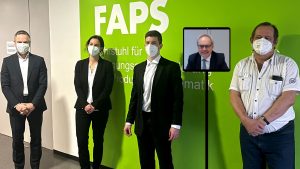
The market for robot-centric automation solutions is a global growth industry. Due to increasing competition, it is becoming increasingly important to make production more flexible and dynamically scalable at low cost. At the same time the competition for the few available skilled workers on the labor market is increasing. In addition, the desired quality along manual processes cannot be achieved by the employees or can only be achieved with difficulty. Also, many manual activities are stressful or unpleasant for people, so an automation solution increases employee satisfaction. Due to increasing globalization, intellectual property protection and environmental protection are moving further into focus through shorter supply chains. Nevertheless, due to the high cost and complexity of robot-centric automation solutions, small and medium-sized enterprises (SMEs) often fall short of this trend.
With the recent successful oral doctoral examination on March 15, 2021, Eike Schäffer very successfully completes his doctorate on the topic “Web- and knowledge-based engineering configurator for robot-centric automation solutions“. Subject and objective of the dissertation is the creation of efficient and scalable engineering concepts and solutions for the planning of robot-centric automation solutions based on web technologies. For this purpose, the engineering configurator concept, a microservice-based web platform reference architecture, and a development method required for engineering configurators based on three sub-methods were introduced. Via user-centered development approaches, a modular architecture for robot-centered automation solutions as well as approaches from knowledge-based configuration (subfield from artificial intelligence (AI)), sales, planning and engineering of robot-centered automation solutions are made accessible to a broader audience. The concepts and methods were validated in the context of the ROBOTOP web platform as well as by means of various 3D web, AR (augmented reality) and VR (virtual reality) multi-user demonstrators and in collaboration with various SMEs, component suppliers and system integrators. The concepts and methods thus also enable efficient digitalization or process automation of the engineering of robot-centric automation solutions through the introduced, structuring methods for knowledge acquisition, modeling as well as implementation and thereby support the vision of the digital twin in the context of Industry 4.0.
